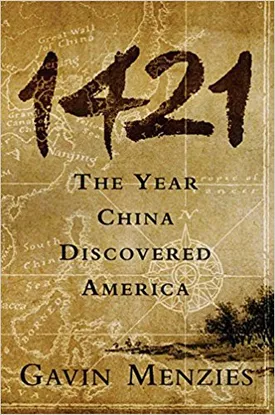Gavin Menzies
Gavin Menzies is a British author and retired submarine Lieutenant Commander in the Royal Navy. He has gained notoriety for his theories, published in his books, that challenge the accepted view of history. He is most famous for his claims that Chinese fleets achieved world exploration much earlier than is currently conceded.
Gavin Menzies was born in 1940 in London. His family had a long naval tradition and he was educated at King’s School, Bruton, and at the Royal Naval College, Dartmouth. He joined the Royal Navy in 1959, and over his career trained as a submariner and was the navigator of HMS Tiptree which, in 1971, rescued the crew of the SS Torrey Canyon, the first major oil-tanker to suffer a major oil spill.
In April of 1994 and after retiring from the navy, Menzies began his career as a self-styled historian. His book, “1421: The Year China Discovered the World,” published in 2002, was an instant bestseller and has been translated into 32 languages in 59 countries.
The book is based on the theory that a massive Chinese fleet made voyages of exploration to Africa, the Americas, the Middle East and Europe between the years 1421 and 1423. Menzies claims that during the Ming Dynasty (1368-1644) the Chinese had 85,000 exiled criminals and 180,000 professional sailors. He suggests that these sailors were developed as a trading group to rival the advanced naval prowess of the Middle East at the time. He claims to have found evidence of the voyages, in the form of artifacts, written accounts and Marco Polo’s notes, to support his theories.
Menzies’ book and theories were met with strong criticism. Kenneth Hall, a professor of Chinese history at the University of Hawaii, described his claims as “outlandish” and “ridiculous.” Vice President of The Royal Geographical Society, Vincent Rimbey described Menzies’ book as a “deeply flawed account of an exceedingly complex subject.”
Menzies responded to the criticism by claiming that most of the detractors did not bother to examine the evidence or consider the interconnections between Chinese, Arabic, and European history. He maintained that because the evidence is from so long ago its interpretation is open to debate and alternative theories.
Menzies’ book spawned a second publication in 2009, “1434: The Year a Magnificent Chinese Fleet Sailed to Italy and Ignited the Renaissance.” This book continues his theories that the Chinese fleets reached Europe much earlier than the current timeline suggests. He claims that a variety of cultural, commercial, and scientific exchanges occurred that changed the course of history and sparked the European Renaissance.
The book ensures that Menzies will remain a controversial figure – while it has its adherents, many agree with the historian Victor Davis Hanson who described Menzies’ work as “nonsense.”
Gavin Menzies is a prominent figure in the field of alternative historical theories, and his books have gained widespread attention. While many disagree with his theories, it is undeniable that his works have encouraged the continuation of debates about our understanding of world history and the information we can deduce from the evidence available to us.

